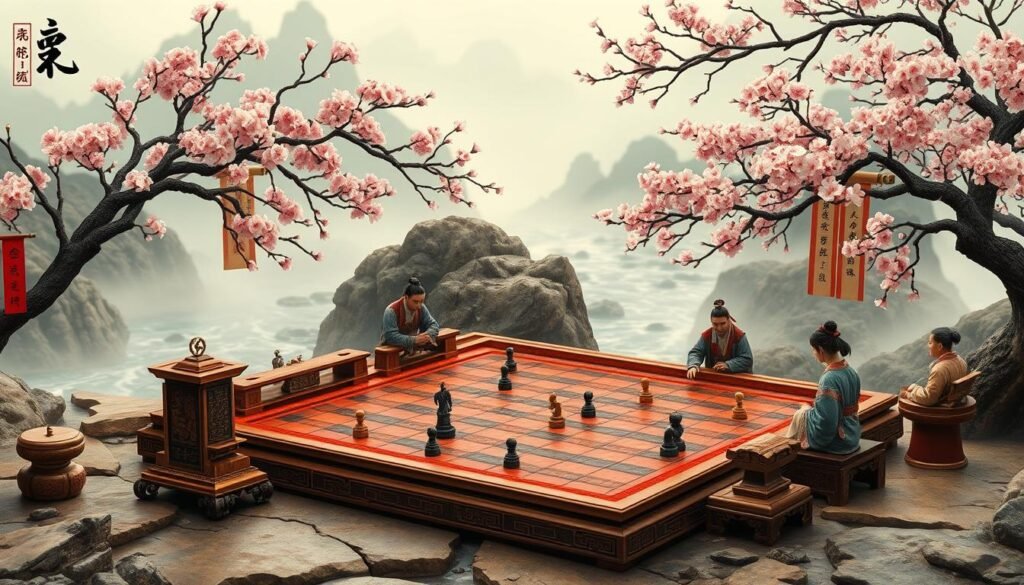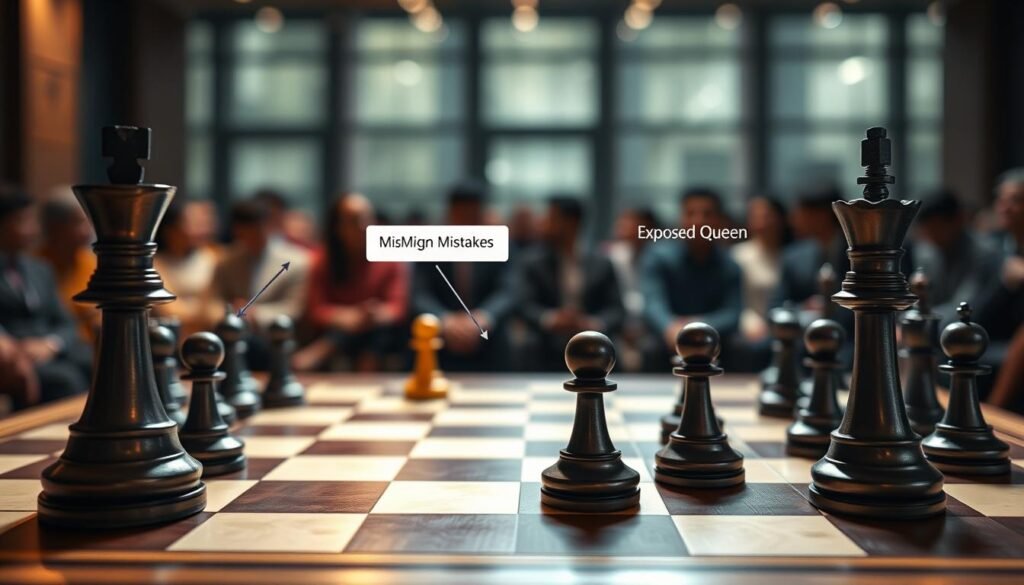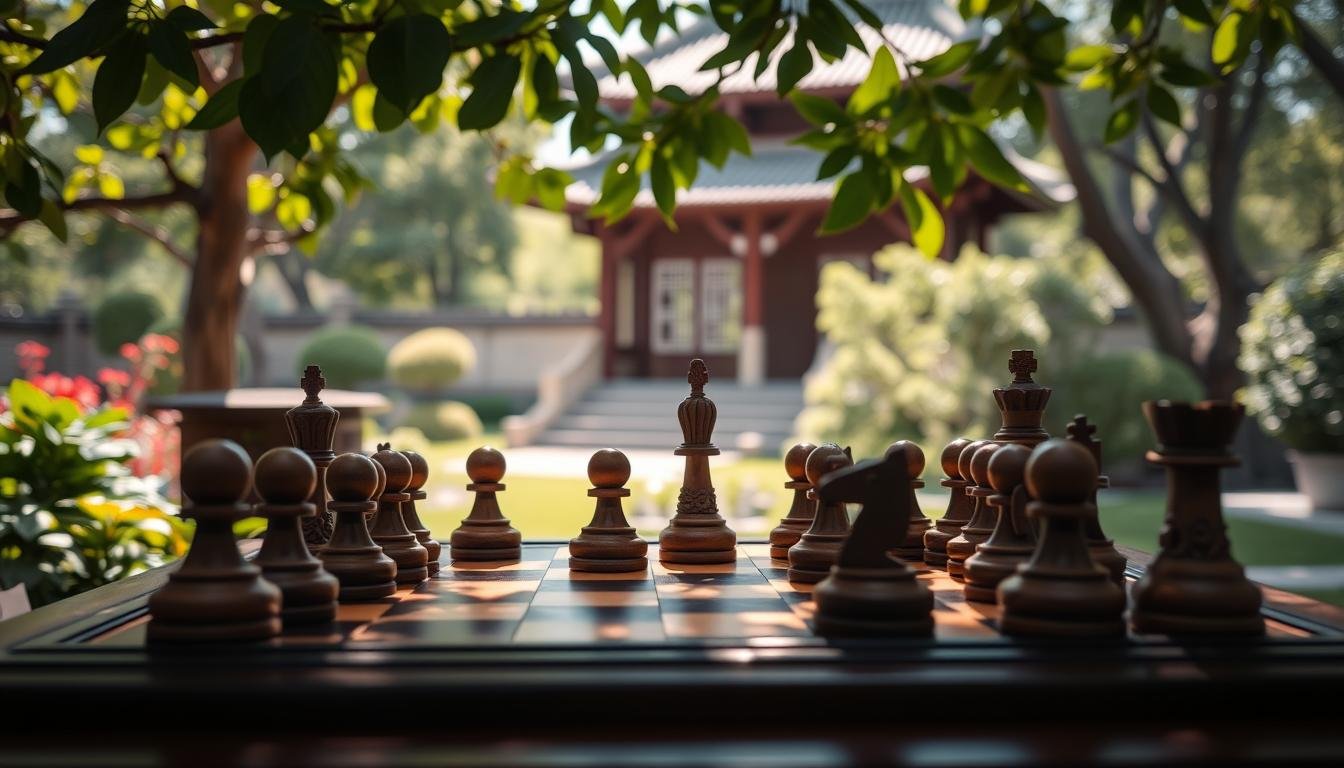Welcome to the enthralling world of Jin Ma Chess, a form of Chinese chess beloved by many. This article provides key strategies and tips to help every player get better. No matter if you are just starting or have been playing for years, there’s something here for you. Understanding Jin Ma Chess’s basic principles is crucial. It will improve your game and increase your enjoyment.
Key Takeaways
- Jin Ma Chess is an engaging variant of Chinese chess.
- Understanding pivotal strategies can significantly improve your game.
- Both offensive and defensive tactics are crucial for success.
- Awareness of common mistakes can lead to better performance.
- Resources are available to further your learning in Xiangqi.
- Mastering the basics lays the groundwork for advanced gameplay.
Introduction to Jin Ma Chess
Jin ma chess is a key part of Chinese chess, also known as xiangqi. It’s an ancient Chinese game loved by many over the years. It’s known far and wide, in China and beyond. The game is all about strategy and tactics, making it stand out from other chess types.
The game is played on a 9×10 grid. Players manage pieces like the general, advisors, and soldiers. Each piece moves differently. Knowing these roles is vital to get good at the game. It makes the game fun for both beginners and experts.
Jin ma chess brings people together. They meet in parks or community centers to play. This shows its strong cultural roots in strategy and friendship. As the game gains new fans around the world, its appeal remains strong.
We will dive deeper into jin ma chess’s rules, pieces, and strategies. This will show more about why Chinese chess is so special.
Understanding the Basics of Chinese Chess
Chinese chess, or xiangqi, is a game full of strategy and complexity. It is played on a board that has 9×10 lines. There are pieces for each player that are placed with care. A river in the middle of the board affects how pieces can move.
Each player leads 16 pieces. This includes generals, advisors, and elephants. Each type moves in a specific way. For example, a general can only stay within a certain area. A cannon piece can jump over others to capture them. This makes xiangqi different from the more familiar international chess.
Learning Chinese chess means getting the hang of basic moves. It also means knowing where to place your pieces. There’s a lot to discover about xiangqi’s rules and tactics here. Mastering these can really sharpen your thinking and strategy skills.
| Piece | Movement | Special Rules |
|---|---|---|
| General | One space horizontally or vertically | Stays within the palace |
| Advisor | One space diagonally | Stays within the palace |
| Elephant | Two spaces diagonally | Cannot cross the river |
| Cannon | One or more spaces horizontally or vertically | Must jump over one piece to capture |
| Horse | One space horizontally or vertically followed by one space diagonally | Cannot move if blocked by another piece |
Digging into the elements of xiangi will definitely grow your love for this game. Knowing the gameplay mechanics is key to becoming better at strategizing for future games.
The History and Origins of Xiangqi
The rich history of xiangqi tells us about its ancient Chinese roots. Known as Chinese chess, it dates back thousands of years, linked to war strategies. The game mimics a military battlefield with its board layout.
Looking into Chinese chess origins, it seems to have grown from early strategy games. Though its exact start is unclear, historians find traces back to the Warring States period in China. These versions were for fun and military training.
Over time, xiangqi became popular across Asia, blending with local cultures. Every area made it its own, adding traditions and tactics to the history of xiangqi. This led to new rules and pieces, especially in Vietnam and nearby regions, showing its broad cultural impact.
The table below highlights key moments in xiangqi’s long history and spread:
| Year | Event | Description |
|---|---|---|
| 10th Century | Formation of Xiangqi | Initial standardization of the game in China with distinct pieces and rules. |
| 13th Century | Spread to Vietnam | Recognition and adaptation of xiangqi in Vietnamese culture, known as “Co Tuong.” |
| 15th Century | Introduction to Korea | Game adopted in Korea, leading to unique variations termed “Janggi.” |
| 20th Century | Global Popularity | Increased interest outside Asia, as xiangqi is introduced to the West. |

This fascinating story of xiangqi enhances our love for the game. Knowing its past, we see not just a game, but a bridge to cultures and history across societies.
Key Pieces in Jin Ma Chess and Their Moves
In the captivating world of jin ma chess, understanding the key pieces and their movements is crucial. Each piece has a unique role that enhances the game. Specifically, the generals and advisors are very important.
Learning how these pieces move helps in forming strategies. The Elephant and Horse add to the complexity, making the game more engaging.
Important Roles of the Generals and Advisors
The generals and advisors are central to jin ma chess. The general leads and moves within the palace, only one space in any direction. It shows the importance of being careful.
Advisors protect the general and move one space diagonally. This setup creates a solid defense. It keeps the general safe while planning ahead.
Understanding the Elephant and Horse
The Elephant and Horse bring different tactics to the game. The Elephant moves two spaces diagonally but can’t cross the river. This adds strategy to its positioning.
Meanwhile, the Horse moves in an L-shape. It goes two spaces in one direction and then one to the side. This allows for surprising moves and quick reactions.
Knowing how these pieces move is key to winning. It gives players an advantage during the game.
| Piece | Movement | Role |
|---|---|---|
| General | One space in any direction (within palace) | Main strategist, leading the gameplay |
| Advisor | One space diagonally | Protects the general |
| Elephant | Two spaces diagonally | Creates defense, cannot cross river |
| Horse | L-shape: two spaces in one direction, one space perpendicular | Flexible attacker, versatile in strategies |
Mastering Jin Ma Chess Strategies
Understanding effective jin ma chess strategies is key to playing well. To get better, players must learn to attack and defend well. This makes the game more exciting and improves your chances of winning.
Offensive Strategies for Winning
To lead in the game, you need good offensive strategies. These can help you gain control over the opponent. Main targets usually include their most important pieces, like the General.
Good attacks include controlling the game’s center. This creates chances to launch attacks. You can also combine moves of different pieces and distract the opponent. This lets you capture their key pieces while keeping control of the game.
Defensive Strategies to Protect Your Base
Having a solid defense is as crucial as being aggressive in jin ma chess. It’s all about keeping your position safe and shielding your General. Here’s how you can defend well:
- Place your pieces to defend weak spots on the board
- Use your advisors and pawns cleverly to form a defense line
- Guess your opponent’s next moves to prepare counterattacks
- Stay flexible to adjust to new game situations
Balancing attack and defense improves your winning chances in chess. Knowing these strategies prepares you for all sorts of game challenges.
Common Mistakes in Jin Ma Chess and How to Avoid Them
Players often mess up in jin ma chess, which hurts their gameplay. It’s key to spot these mistakes early. One big mistake is not paying attention to how pieces are placed. If your pieces are in bad spots, your opponent can take over the game easily.
Also, many players don’t protect their generals and advisors enough. These pieces are very important. Losing them can mess up your whole game plan. To get better, check your board often and change your strategy when you need to.
To improve your focus in games, try these tips:
- Think hard about each move before you make it.
- Guess what your opponent might do next.
- Try to plan several moves ahead to stay ahead.
Making mindfulness a habit can really improve your decision-making. It also helps you avoid those common mistakes in jin ma chess. Being more aware of the game can make you play better and enjoy the game more.

Tips for Improving Your Jin Ma Chess Game
Getting better at jin ma chess is about mixing practice with strategy. We have some chess tips to help you get better:
- Study Professional Matches: Watching top-level games teaches you effective strategies and tactics.
- Regular Practice: Playing against various opponents improves flexibility and sharpens your choices.
- Utilize Online Resources: There are many websites and apps that provide lessons and simulations for jin ma chess.
- Review Past Games: Looking over your past games helps identify both your strong points and weaknesses.
- Reflect on Decisions: Considering your past moves helps in making better decisions in future games.
By adding these practices to your routine, your chess skills will greatly improve. Stay dedicated and eager to pick up new things, and you’ll see your game level up.
Resources for Further Learning About Xiangqi
If you’re excited to learn more about xiangqi, there are many great resources out there. Do you want to learn jin ma chess or get better at strategy? These resources are perfect for you.
Books: There are lots of books on Chinese chess that teach you the game’s tactics and strategy. Here are a few top picks:
| Title | Author | Focus |
|---|---|---|
| The Art of Xiangqi | Li Ming | Strategies and tactics |
| Mastering Jin Ma Chess | Chen Wei | Advanced gameplay techniques |
| Xiangqi for Beginners | Wang Yu | Basic rules and gameplay |
Online Resources: You can also find helpful websites and forums. These places are great for learning jin ma chess. They offer lessons from the community and tips for improving.
- Xiangqi.com – This site has tutorials and articles on different strategies.
- Chess.com – It has a xiangqi section where you can play practice games.
- Reddit/R/Xiangqi – A place where players share their experiences and advice.
Videos and Tutorials: If you prefer watching videos, there are plenty online that break down complex strategies. You can find channels on YouTube. They have experienced players teaching the details of the game.
Using these xiangqi resources will definitely make you better at the game. Whether you’re reading books or joining forums, learning jin ma chess has never been easier.
Conclusion
Mastering jin ma chess is not just about knowing the game. It’s about understanding its deep strategies. Learning about the key pieces and moves helps players get better. Remember, becoming great at jin ma chess is a journey that always helps you grow.
Using the strategies we talked about can make you play better. Practicing a lot and learning about jin ma chess’s history makes you enjoy the game more. Let yourself love the game’s complexities at each match.
Playing jin ma chess does more than make your mind sharp. It connects you with a rich culture and community. Meet other players, join tournaments, and look for new information. Every game is a chance to learn, grow, and have fun!


